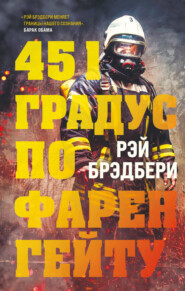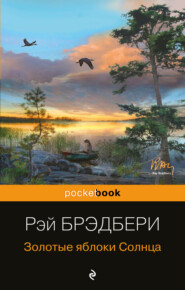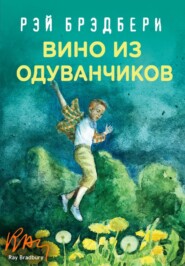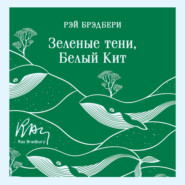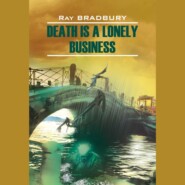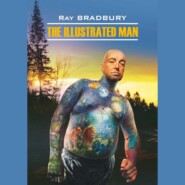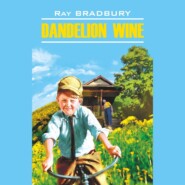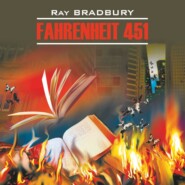По всем вопросам обращайтесь на: info@litportal.ru
(©) 2003-2025.
✖
Dandelion Wine
Автор
Год написания книги
2018
Настройки чтения
Размер шрифта
Высота строк
Поля
It was this then, the mystery of man seizing from the land and the land seizing back, year after year, that drew Douglas, knowing the towns never really won, they merely existed in calm peril, fully accoutered with lawn mower, bug spray and hedge shears, swimming steadily as long as civilization said to swim, but each house ready to sink in green tides, buried forever, when the last man ceased and his trowels and mowers shattered to cereal flakes of rust.
The town. The wilderness. The houses. The ravine. Douglas blinked back and forth. But how to relate the two, make sense of the interchange when …
His eyes moved down to the ground.
The first rite of summer, the dandelion picking, the starting of the wine, was over. Now the second rite waited for him to make the motions, but he stood very still.
‘Doug … come on … Doug …!’ The running boys faded.
‘I’m alive,’ said Douglas. ‘But what’s the use? They’re more alive than me. How come? How come?’
And standing alone, he knew the answer, staring down at his motionless feet …
Late that night, going home from the show with his mother and father and his brother Tom, Douglas saw the tennis shoes in the bright store window. He glanced quickly away, but his ankles were seized, his feet suspended, then rushed. The earth spun; the shop awnings slammed their canvas wings overhead with the thrust of his body running. His mother and father and brother walked quietly on both sides of him. Douglas walked backward, watching the tennis shoes in the midnight window left behind.
‘It was a nice movie,’ said Mother.
Douglas murmured, ‘It was …’
It was June and long past time for buying the special shoes that were quiet as a summer rain falling on the walks. June and the earth full of raw power and everything everywhere in motion. The grass was still pouring in from the country, surrounding the sidewalks, stranding the houses. Any moment the town would capsize, go down and leave not a stir in the clover and weeds. And here Douglas stood, trapped on the dead cement and the red-brick streets, hardly able to move.
‘Dad!’ He blurted it out. ‘Back there in that window, those Cream-Sponge Para Litefoot Shoes …’
His father didn’t even turn. ‘Suppose you tell me why you need a new pair of sneakers. Can you do that?’
‘Well …’
It was because they felt the way it feels every summer when you take off your shoes for the first time and run in the grass. They felt like it feels sticking your feet out of the hot covers in wintertime to let the cold wind from the open window blow on them suddenly and you let them stay out a long time until you pull them back in under the covers again to feel them, like packed snow. The tennis shoes felt like it always feels the first time every year wading in the slow waters of the creek and seeing your feet below, half an inch further downstream, with refraction, than the real part of you above water.
‘Dad,’ said Douglas, ‘it’s hard to explain.’
Somehow the people who made tennis shoes knew what boys needed and wanted. They put marshmallows and coiled springs in the soles and they wove the rest out of grasses bleached and fired in the wilderness. Somewhere deep in the soft loam of the shoes the thin hard sinews of the buck deer were hidden. The people that made the shoes must have watched a lot of winds blow the trees and a lot of rivers going down to the lakes. Whatever it was, it was in the shoes, and it was summer.
Douglas tried to get all this in words.
‘Yes,’ said Father, ‘but what’s wrong with last year’s sneakers? Why can’t you dig them out of the closet?’
Well, he felt sorry for boys who lived in California where they wore tennis shoes all year and never knew what it was to get winter off your feet, peel off the iron leather shoes all full of snow and rain and run barefoot for a day and then lace on the first new tennis shoes of the season, which was better than barefoot. The magic was always in the new pair of shoes. The magic might die by the first of September, but now in late June there was still plenty of magic, and shoes like these could jump you over trees and rivers and houses. And if you wanted, they could jump you over fences and sidewalks and dogs.
‘Don’t you see?’ said Douglas. ‘I just can’t use last year’s pair.’
For last year’s pair were dead inside. They had been fine when he started them out, last year. But by the end of summer, every year, you always found out, you always knew, you couldn’t really jump over rivers and trees and houses in them, and they were dead. But this was a new year, and he felt that this time, with this new pair of shoes, he could do anything, anything at all.
They walked up the steps to their house. ‘Save your money,’ said Dad. ‘In five or six weeks —’
‘Summer’ll be over!’
Lights out, with Tom asleep, Douglas lay watching his feet, far away down there at the end of the bed in the moonlight, free of the heavy iron shoes, the big chunks of winter fallen away from them.
‘Reasons. I’ve got to think of reasons for the shoes.’
Well, as anyone knew, the hills around town were wild with friends putting cows to riot, playing barometer to the atmospheric changes, taking sun, peeling like calendars each day to take more sun. To catch those friends, you must run much faster than foxes or squirrels. As for the town, it steamed with enemies grown irritable with heat, so remembering every winter argument and insult. Find friends, ditch enemies! That was the Cream-Sponge Para Litefoot motto. ‘Does the world run too fast? Want to catch up? Want to be alert, stay alert? Litefoot, then! Litefoot!’
He held his coin bank up and heard the faint small tinkling, the airy weight of money there.
Whatever you want, he thought, you got to make your own way. During the night now, let’s find that path through the forest …
Downtown, the store lights went out, one by one. A wind blew in the window. It was like a river going downstream and his feet wanting to go with it.
In his dreams he heard a rabbit running running running in the deep warm grass.
Old Mr Sanderson moved through his shoe store as the proprietor of a pet shop must move through his shop where are kenneled animals from everywhere in the world, touching each one briefly along the way. Mr Sanderson brushed his hands over the shoes in the window, and some of them were like cats to him and some were like dogs; he touched each pair with concern, adjusting laces, fixing tongues. Then he stood in the exact center of the carpet and looked around, nodding.
There was a sound of growing thunder.
One moment, the door to Sanderson’s Shoe Emporium was empty. The next, Douglas Spaulding stood clumsily there, staring down at his leather shoes as if these heavy things could not be pulled up out of the cement. The thunder had stopped when his shoes stopped. Now, with painful slowness, daring to look only at the money in his cupped hand, Douglas moved out of the bright sunlight of Saturday noon. He made careful stacks of nickels, dimes, and quarters on the counter, like someone playing chess and worried if the next move carried him out into sun or deep into shadow.
‘Don’t say a word!’ said Mr Sanderson.
Douglas froze.
‘First, I know just what you want to buy,’ said Mr Sanderson. ‘Second, I see you every afternoon at my window; you think I don’t see? You’re wrong. Third, to give it its full name, you want the Royal Crown Cream-Sponge Para Litefoot Tennis Shoes: “LIKE MENTHOL ON YOUR FEET!” Fourth, you want credit.’
‘No!’ cried Douglas, breathing hard, as if he’d run all night in his dreams. ‘I got something better than credit to offer!’ he gasped. ‘Before I tell, Mr Sanderson, you got to do me one small favor. Can you remember when was the last time you yourself wore a pair of Litefoot sneakers, sir?’
Mr Sanderson’s face darkened. ‘Oh, ten, twenty, say, thirty years ago. Why …?’
‘Mr Sanderson, don’t you think you owe it to your customers, sir, to at least try the tennis shoes you sell, for just one minute, so you know how they feel? People forget if they don’t keep testing things. United Cigar Store man smokes cigars, don’t he? Candy-store man samples his own stuff, I should think. So …’
‘You may have noticed,’ said the old man, ‘I’m wearing shoes.’
‘But not sneakers, sir! How you going to sell sneakers unless you can rave about them and how you going to rave about them unless you know them?’
Mr Sanderson backed off a little distance from the boy’s fever, one hand to his chin. ‘Well …’
‘Mr Sanderson,’ said Douglas, ‘you sell me something and I’ll sell you something just as valuable.’
‘Is it absolutely necessary to the sale that I put on a pair of the sneakers, boy?’ said the old man.
‘I sure wish you could, sir!’
The old man sighed. A minute later, seated panting quietly, he laced the tennis shoes to his long narrow feet. They looked detached and alien down there next to the dark cuffs of his business suit. Mr Sanderson stood up.
‘How do they feel?’ asked the boy.
‘How do they feel, he asks; they feel fine.’ He started to sit down.
‘Please!’ Douglas held out his hand. ‘Mr Sanderson, now could you kind of rock back and forth a little, sponge around, bounce kind of, while I tell you the rest? It’s this: I give you my money, you give me the shoes, I owe you a dollar. But, Mr Sanderson, but – soon as I get those shoes on, you know what happens?’






